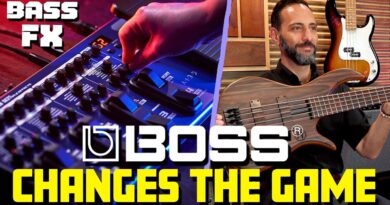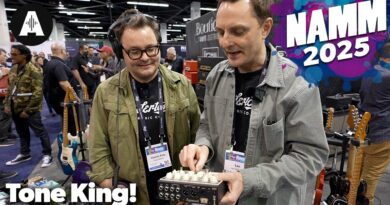How 70s Music Was Recorded (And Why It’s Unmatched)
Today we are discussing what gives that 70s sound.
Patreon:
https://patreon.com/NicoRinehart?utm_medium=unknown&utm_source=join_link&utm_campaign=creatorshare_creator&utm_content=copyLink
GEAR I USE:
Guitar Cables – https://amzn.to/4dmSKaj
Dock – https://amzn.to/3N3ZoHq
Laptop Station – https://amzn.to/3MXC8ea
Headphones – https://amzn.to/3XVzo7x
Keyboard + Mouse – https://amzn.to/47CJ7mx
Camera – https://amzn.to/3N0TxCW
Interface – https://amzn.to/3ZW8uOv
Tripod – https://amzn.to/3XVFJ2G
Lenses – https://amzn.to/3Brzjzv
Wireless Monitor – https://amzn.to/3ZCTo07
Lights – https://amzn.to/3zkIBwU
Hair Product 
Microphone – https://amzn.to/3ZCRvAp
Cage – https://amzn.to/3Bekhgu
Hydration – https://amzn.to/3zA07x8
Nicorinehart.com
Don’t forget to like, comment, and subscribe for more music deep dives!
#musictechnology #musichistory #modernmusic #autotune #synthesizer #DigitalSampling #musicinnovation #musicindustry #electronicmusic #vintagemusic #musicevolution #popmusic #musicproduction
#70s #Music #Recorded #Unmatched
Originally posted by UCavHuF_e6mIFRIBovcYloww at https://www.youtube.com/watch?v=pLpHNm3_UP0




Nice!
I truly miss the 70's and 80's. It wasn't just the mixing and recording, it was also the content of the music being recorded.
And sorry, I have to say it because it's the retired First Sergeant in me. Make you bed dude. Every morning first thing make your bed clean and neat. It will discipline your mind and get you ready to meet the day. Try it.
Yes going way back to early recoding would be very interesting .
The 70's was the YOUNG decade where almost everything was perfect . We have DE-EVOLUTE since then, it would be great to return to the 70's tastes in EVERY aspect of our lives (cars…music…fashion…hair…..records…..etc..)
As someone who was bitten by the music bug over 30 years ago, I can remember the older people telling me the music I liked, listened to and created was crap, only for it to be celebrated today in its own right, so I hope that encourages you to take much of the criticism from my generation of your favorite music of today with a grain of salt, as I have realized the elders' inherent disdain for modern pop music is part and parcel to the progression of pop music. I say that to also express my appreciation for someone so young still being able to enlighten me on things I didn't know! Thanks, bro!
The Upstairs At United series is a good example of how good analog can sound, everything is recorded live and transferred to vinyl.
Nice angle. Something to think about even in the digital age.
good job bro, make more videos
Noise reduction is about the only bit of gear that would make a difference. Its not the tape or mics or any of that.
The main thing is they were in the analog world. The general mindset of people engineering songs is the mindset of trying to make the song sound like the musicians are in the room with you. In the 70s they WERE all in a room together most of the time with mics on the instruments so right off the bat you could just record everything clean and automatically you have a room feel. Now so much is direct inputs into the boards or DAWs, so then you have to try and manipulate it to make it sound like a room.
This is a really cool video! I don’t usually see much talk about production in the 1920s-50s so seeing that you were potentially interested at the end was cool to hear.
Random fun fact: in the early 1920s you couldn’t mix the music due to the recording method. So you had to position the members of the band in a specific way. Loud players at the back, quieter players at the front. And they’d all be playing as loud as they could into a giant horn.
Yeah go listen to how Van Halen sounded in 78 the in 81 a good lesson on sound for a youngin like yourself, you might learn something.
Great video
Love this video, wishing you success brother
You really know your stuff man!
Cool stuff. I love watching documentaries about how bands recorded back in the day. They're always a lot of fun.
People like to complain about music today, but they just aren't looking hard enough. Every era has crap. The 60s was full of one hit wonder throw away songs that were essentially created by marketing teams and performed by people with minimal talent, which is the same complaint people make today. Do we think the 60s sucked for music? Hell no.
I'm more than twice your age and like to think I have decent taste in music. I'm a musician. I routinely listen to stuff from today back to the 50s. I think a lot of people get stuck thinking a certain period had the "best" music, but when you look closely you'll notice that period usually holds nostalgic value for them, like teenage years and early 20s. It's easy to get stuck in that mindset but people miss so much when they do that. Stop complaining that there's nothing out there and start looking, people. Or better yet, make something yourself, it's fun!
Tape
I really couldn't understand much of what you were describing, however the 1970's was a great time to be a little kid. Most notably, an absence of a lamentable preoccupation with something called "safety".
They sure had more life instruments. They had different taste of how to mix. When Thrash metal came around no one knew how to mix it. There is bunch of badly mixed metal recordings. Kick drums were hit and miss. Vocals and guitars were hit and miss. Now there is more uniformity in the way things are mixed because of experience. So yes, it's partially the gear but also the musical tastes of the recording and mixing engineers. And off course now there is very precise EQs in the computers that very specifically target frequencies. There is more drum samples today and any samples. Bottom line-there is a lot of different aspects of recording and mixing that have changed over the years. Not just the gear.
Something which I don't think has been mentioned is that on tape, tracks are always mono. On a DAW you can record a stereo signal and call that a single track, but on tape you need to use two tracks to record a stereo signal – the mixing desk determines how the tracks are panned, not the deck. Hence, if you were going to submix the drums on a 16 or 24 track system because you've run out of space, you'd bounce it to a stereo pair. If working on 8-track you might bounce to a pair of tracks on another 8-track machine to avoid losing the original version entirely.
There's also a trick you can do where the drums are recorded in mono, but you give them a kind of "fake stereo" effect during the mix using a stereo reverb (usually a plate, as mentioned).
I understand your feelings on the current music scene of today, you're a kid.
Truth be told because rap didn’t exist yet, and now it dominates the charts. Even wealthy white kids from Fairfield, Connecticut are talking with Ebonics.
I was born in the 60s so grew up with 70s sounds, now even though I use protools i still record like them days …minimalist tracks and get the sound right at the microphone….
becasue 60ies was too dark …..and 80ies too bright…too weird…70ies had that modern sound….creamy, balanced…. 90ies was cheap digital…. so yeah, it was just the right time…. and it's probably 1972 to 1979
Modern music is as fake as most modern “musicians”.
I highly enjoyed your video. Your interest in production values and interning at a studio are admirable.
Part of the sound was the massive compression/limiting from radio stations. The sound of the 70s was the volume leveled sound coming through FM radio.
There are so many great recording history subjects. There are a lot of interesting subjects on the progress of the analog digital stuff. Bands are still making music but there seems a definite differentiation between in the box and out of box 'production'. I am not really familiar with just how many old mixing consoles are still in use as you often encounter many older consoles have been cannibalized and rebuilt. I am curious how many consoles were actually made in the 1960s and 1970s. The digital technology was still being discovered in the 60's and 70s. The 1980s and 1990s are great decades that are a massive transition, however if you really look at it for the last 100+ years the technology has constantly evolved. I am not even sure how to define modern music what that even means as I tend to see music as a snowball in that its abilities have built over time – it is just the cost of securing or building rare gear or finding ways to emulate it. Techniques are still relevant today imo like you don't reinvent how to play the violin or guitar so why would you do it with an instrument like a mic or an amp or a computer. I think it would be hard to reinvent the wheel. That is a great topic there.. has modern music reinvented the wheel or just added new hubs to it?
2006 dude we both can buy alcohol cuz how old we both look same age!
You're so lucky to have a dad that influenced you and no doubt given you some of his skills as a producer. I'm the first musician in my entire family. Thankfully, my parents were always BIG into music – collecting all kinds of vinyl and CDs in all kinds of genres since I was a kid. Being British as well, we had so many awesome new styles emerging in the 80s as well, like electronic, rock, dance, punk, metal etc.. it was awesome.
I'm mostly self taught in the past 20 years when it comes to production and mixing and I've always loved the history of studio equipment – so you've earned yourself a new subscriber, as this was a fantastic dive into the 70s sound!
Personally, from a 'sound' perspective, my favourite flavour of mixes is from the 80s. I believe that this is because it was where the solid state and great analogue equipment has been around long enough for people to learn and master it, multi-tracking was the best – allowing a lot of re-takes, new synths , drum machines and electronic stuff was improving the sound and influencing an increase in the bass in mixes, removing a lot of the imperfections and mis-timing..
The worst time in sound was probably the early 90s where digital came in, nobody understood how to get good mixes from it. We lost a lot of analogue warmth (it would take a decade or more before people started to crave the analogue saturation and go back to hybrid studios). Probably why there is so many remasters issued of great 90s albums.,
Analog is the elephant in the room here. No apple computers, no samplers, no drum machines (except in a couple of weird situations). No digitizing of real sound output, or using plugins to imitate actual electronic devices handling sound waves. I know this, I've lived through this change, full stop.
I’ve been listening to Rock on by David Essex this week. A favorite from the 70s. But listening to it from the perspective of recording techniques and mixing. Just basically dissecting it. I loved it as a kid and still do. But now from this perspective I realize what a recording gem it is.
Tape "mojo" notwithstanding-
I cannot understand why you can listen to something like "Abbey Road" and hear all the depth, presence, and complexity of the tone,
And then you listen to the sound of the early '80s British new wave, also done on tape, and it all sounds like it's coming out of an empty coffee can.
Granted, reverb was abused wholesale at that time, but it all sounds so tinny, sterile, and distant.
From my perspective, it wasn't until the mid-late '80s explosion of metal(not the butt-rock), that music started to regress back into having that punch, and fidelity.
As every guitar pickup manufacturer says, " The booming lows, the creamy mid-range, and the searing highs".
That feeling of being in the room while they play, when you had headphones on.
It Sounds like that because your ears were more important than monitor displays and meters. Sounds were analogue and not digital representation of analogue.
When photography was based on film, which was expensive to buy and process, one had to be very selective on shots. When shooting weddings back in the 70's, 80's, getting 180 pics was a lot. In the digital age, not unusual for a wedding photog to get over 3000 pics.
Same with music production. Having so many tools/tweaking possibilities/variables leads to overthinking the music. Some music benefits from it, but chasing
"perfection" in art can be draining, and unnecessary-and not discernible by most ears.
Please what is the the title of the song you played at the beginning of the video? Or maybe the name of the Artist
A lot of interesting info in this video, however more images of the mics, preamps, mixers etc used would have been helpful. Show us the gear.
70s gave us normal stereo
Another significant part of the 70s sound (and the years leading up to it) was the fact that the limited number of tracks meant that the songs needed to have actual arrangements. This made it possible to make the most efficient use of the available tracks and ensured that the songs would be well planned out before committing them to (very expensive) tape. The songs were also rehearsed before recording so the actual recording was tight and required little editing and not nearly as much mixing as they often do today. And since outboard gear was so expensive and consoles and DAWs didn’t have dynamics on every track, the sounds were shaped by mic placement and careful riding of the console faders. This yielded a much more punchy and dynamic sound. Good players + engineers with good ears = great sounding music.
Damn! That intro quality sounds nice! ????
My favorite decade for production! So much better than the hollow soulless artificiality of the 80s! :3